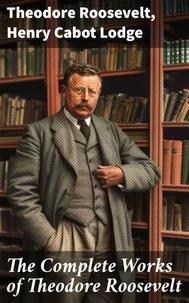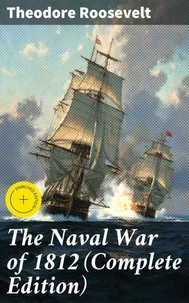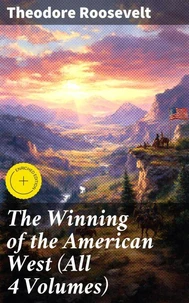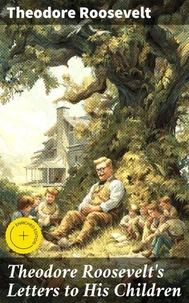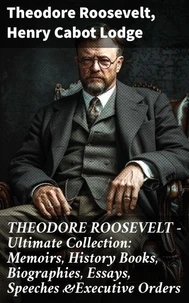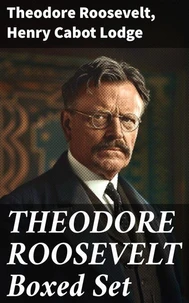The Winning of the West: A History of the American Frontiers
Par :Formats :
Disponible dans votre compte client Decitre ou Furet du Nord dès validation de votre commande. Le format ePub est :
- Compatible avec une lecture sur My Vivlio (smartphone, tablette, ordinateur)
- Compatible avec une lecture sur liseuses Vivlio
- Pour les liseuses autres que Vivlio, vous devez utiliser le logiciel Adobe Digital Edition. Non compatible avec la lecture sur les liseuses Kindle, Remarkable et Sony
 , qui est-ce ?
, qui est-ce ?Notre partenaire de plateforme de lecture numérique où vous retrouverez l'ensemble de vos ebooks gratuitement
Pour en savoir plus sur nos ebooks, consultez notre aide en ligne ici
- Nombre de pages982
- FormatePub
- ISBN859-65--4775359-9
- EAN8596547753599
- Date de parution15/12/2023
- Protection num.Digital Watermarking
- Taille1 Mo
- Infos supplémentairesepub
- ÉditeurDIGICAT
Résumé
In "The Winning of the West: A History of the American Frontiers, " Theodore Roosevelt offers a vivid and compelling narrative chronicling the expansion of American frontier life and its profound impact on the nation's identity. Written in an engaging, almost heroic style, Roosevelt blends a personal perspective with academic rigor, exploring themes of adventure, survival, and the transformative power of the American spirit.
This four-volume work bridges the gap between scholarly histories and popular narratives, situating the movement westward within the larger context of Manifest Destiny and nationalism in the 19th century. Theodore Roosevelt, a prominent figure in American politics and a fervent advocate for conservation and the outdoors, was deeply influenced by his own experiences in the West, particularly in South Dakota.
His personal affinity for the rugged individualism and frontier spirit shaped his belief in the importance of the American frontier in forging national character and democracy. Roosevelt's background as a naturalist and historian is reflected in his meticulous research and passionate prose, making the text not only informative but also deeply personal. For readers interested in American history, frontier studies, or the evolution of national identity, Roosevelt's "The Winning of the West" is an indispensable work.
It provides an eloquent exploration of the struggles and triumphs intrinsic to the American experience, inviting readers to confront the complexities of expansion and the spirit that propelled a nation into vast, uncharted territories.
This four-volume work bridges the gap between scholarly histories and popular narratives, situating the movement westward within the larger context of Manifest Destiny and nationalism in the 19th century. Theodore Roosevelt, a prominent figure in American politics and a fervent advocate for conservation and the outdoors, was deeply influenced by his own experiences in the West, particularly in South Dakota.
His personal affinity for the rugged individualism and frontier spirit shaped his belief in the importance of the American frontier in forging national character and democracy. Roosevelt's background as a naturalist and historian is reflected in his meticulous research and passionate prose, making the text not only informative but also deeply personal. For readers interested in American history, frontier studies, or the evolution of national identity, Roosevelt's "The Winning of the West" is an indispensable work.
It provides an eloquent exploration of the struggles and triumphs intrinsic to the American experience, inviting readers to confront the complexities of expansion and the spirit that propelled a nation into vast, uncharted territories.
In "The Winning of the West: A History of the American Frontiers, " Theodore Roosevelt offers a vivid and compelling narrative chronicling the expansion of American frontier life and its profound impact on the nation's identity. Written in an engaging, almost heroic style, Roosevelt blends a personal perspective with academic rigor, exploring themes of adventure, survival, and the transformative power of the American spirit.
This four-volume work bridges the gap between scholarly histories and popular narratives, situating the movement westward within the larger context of Manifest Destiny and nationalism in the 19th century. Theodore Roosevelt, a prominent figure in American politics and a fervent advocate for conservation and the outdoors, was deeply influenced by his own experiences in the West, particularly in South Dakota.
His personal affinity for the rugged individualism and frontier spirit shaped his belief in the importance of the American frontier in forging national character and democracy. Roosevelt's background as a naturalist and historian is reflected in his meticulous research and passionate prose, making the text not only informative but also deeply personal. For readers interested in American history, frontier studies, or the evolution of national identity, Roosevelt's "The Winning of the West" is an indispensable work.
It provides an eloquent exploration of the struggles and triumphs intrinsic to the American experience, inviting readers to confront the complexities of expansion and the spirit that propelled a nation into vast, uncharted territories.
This four-volume work bridges the gap between scholarly histories and popular narratives, situating the movement westward within the larger context of Manifest Destiny and nationalism in the 19th century. Theodore Roosevelt, a prominent figure in American politics and a fervent advocate for conservation and the outdoors, was deeply influenced by his own experiences in the West, particularly in South Dakota.
His personal affinity for the rugged individualism and frontier spirit shaped his belief in the importance of the American frontier in forging national character and democracy. Roosevelt's background as a naturalist and historian is reflected in his meticulous research and passionate prose, making the text not only informative but also deeply personal. For readers interested in American history, frontier studies, or the evolution of national identity, Roosevelt's "The Winning of the West" is an indispensable work.
It provides an eloquent exploration of the struggles and triumphs intrinsic to the American experience, inviting readers to confront the complexities of expansion and the spirit that propelled a nation into vast, uncharted territories.


